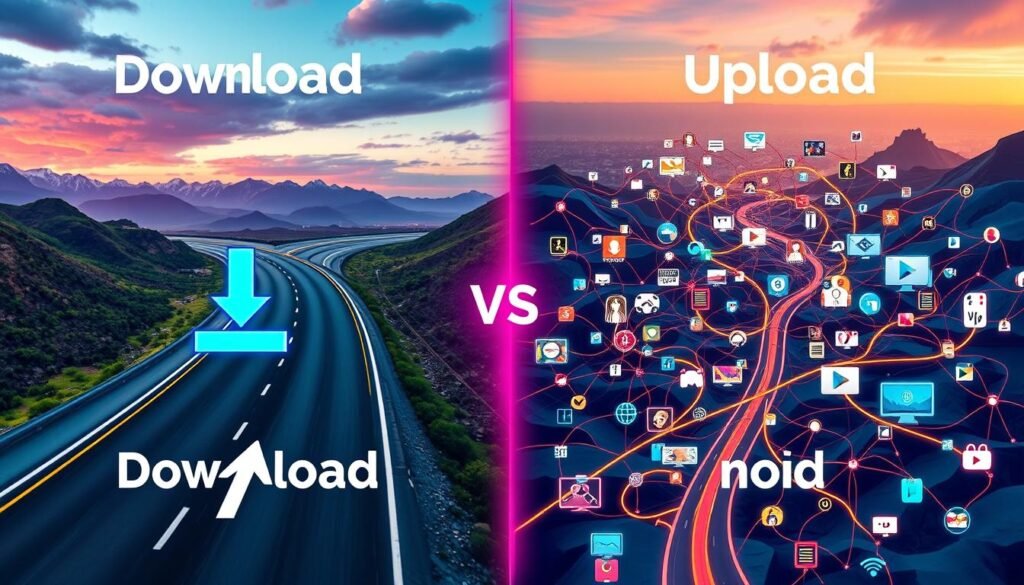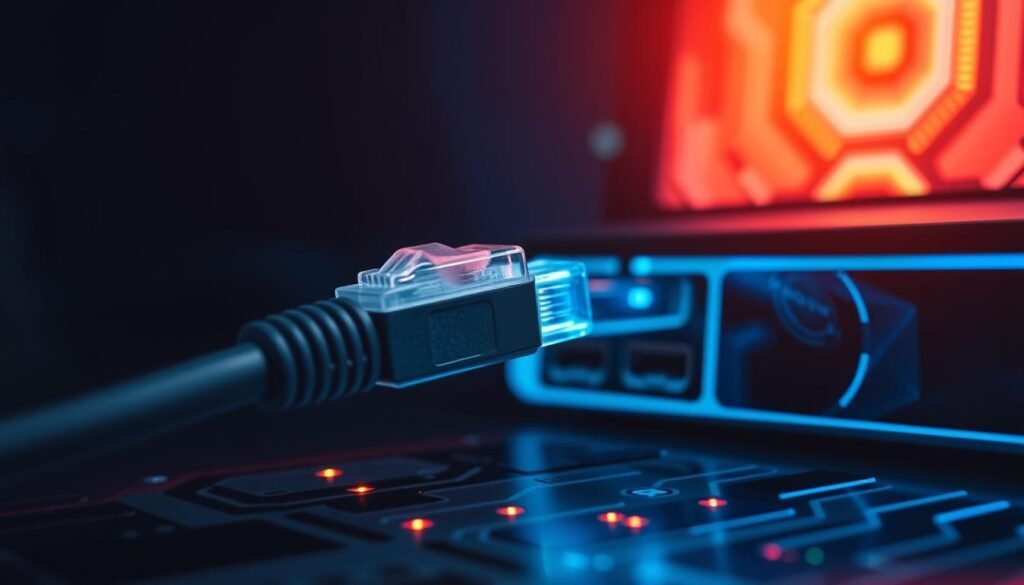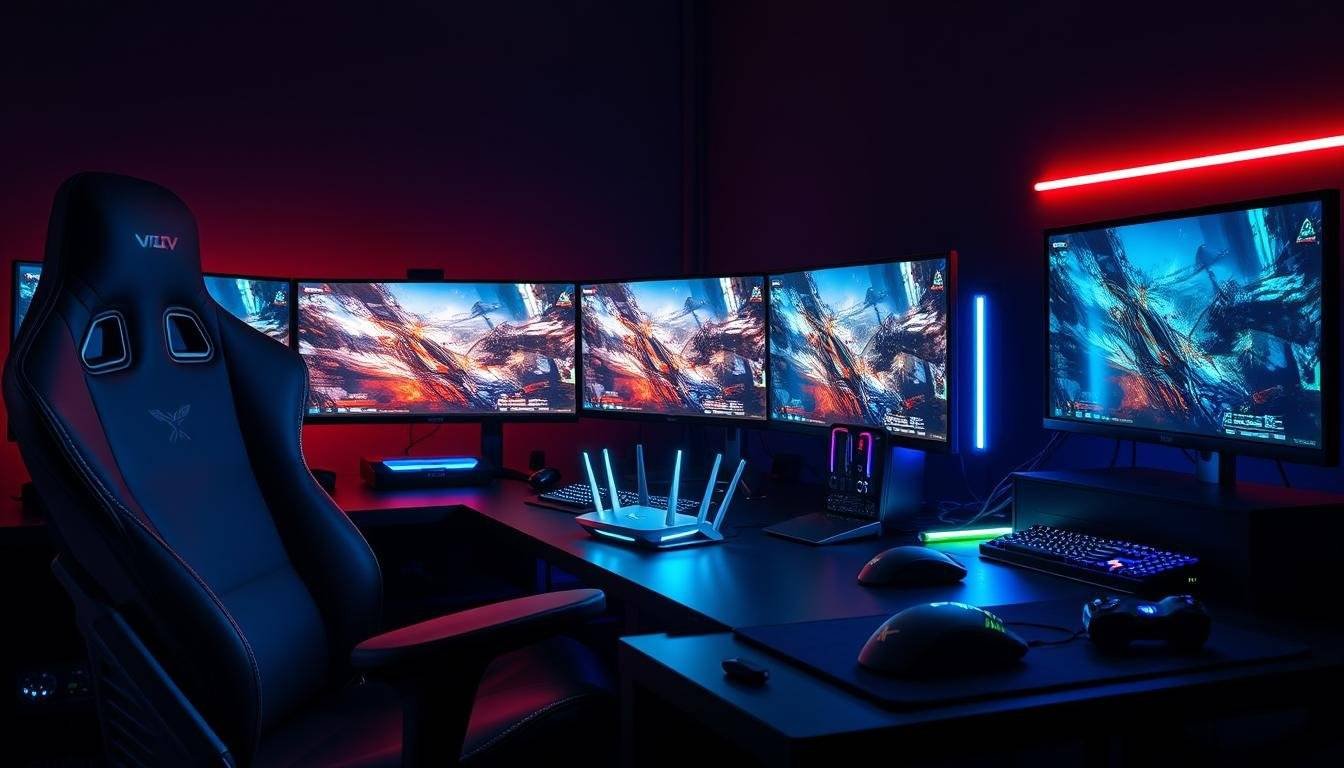Did you know that serious gamers and streamers need a super-fast 1,000 Mbps (1 Gbps) internet? That speed is perfect for smooth 4K video, quick file sharing, and using many devices at once. But, for most gamers, a much slower speed is enough.
In this guide, we’ll dive into the details of internet speeds for gaming. We’ll cover the minimum and recommended speeds, and how different things can affect your gaming online. Whether you play a little or a lot, knowing the right internet speed is key.
Key Takeaways
- Most gamers need speeds of 10-25 Mbps download and 5-10 Mbps upload1.
- The minimum speed for gaming is 3 Mbps download, 0.5-1 Mbps upload, and a ping rate under 150 ms1.
- For better gaming, aim for 15-25 Mbps download, 5 Mbps upload, and a ping rate under 50 ms1.
- Bandwidth is in Mbps, and ping rate is in ms1.
- Internet types like fiber, cable, DSL, and fixed wireless work for gaming, with different speeds and latency1.
Understanding Internet Speed Basics
Gaming online requires knowing about internet speed. It’s how fast data moves from your device to the internet, shown in Mbps (megabits per second)2. This speed affects how fast you can download and upload things, like web pages and videos.
What Is Internet Speed?
There are two main parts to internet speed: download and upload. Download speed is how fast you get data from the internet. Upload speed is how fast you send data. Bandwidth is also key, as it’s the max data you can transfer at once3.
Ping rate or latency shows how quickly your actions show up on screen. This is very important for games that need to react fast4.
How Is Internet Speed Measured?
Internet speed is usually shown in Mbps (megabits per second) for both download and upload3. The more Mbps, the faster your connection. The FCC says you need at least 25 Mbps download and 3 Mbps upload for broadband2.
But, some think we need 100 Mbps for both to keep up with today’s internet needs2.
The FCC has different internet use levels. Basic needs 3-8 Mbps, while advanced needs 25+ Mbps2. For simple tasks like browsing, 1 Mbps is enough. But, for downloading files, you need at least 10 Mbps3.
Students, remote workers, and those doing HD video calls should have 25 Mbps2. Gamers need at least 3 Mbps for console and 4 Mbps for online play4.
To game smoothly, aim for 100 Mbps download and 10 Mbps upload2. Internet speeds can range from under 1 Mbps to over 5,000 Mbps2. Faster speeds can also reduce lag and improve latency2.
For many users or devices, 100 Mbps is a good speed. But, 500 to 1000 Mbps is even better2.
“Internet speed is the rate at which data is transferred between your device and the internet. It’s measured in Mbps (megabits per second).”
Minimum Speed Requirements for Gaming
Online gaming needs different internet speeds based on the game and platform5. The FCC suggests a download speed of 4 Mbps for multiplayer games. Most gamers prefer speeds of at least 25 Mbps5.
People with 50 Mbps plans might see speeds between 50-75 Mbps. This can be due to modem quality or Wi-Fi issues5.
Different Types of Games
Internet speed needs change with game genres. For example, first-person shooters need more bandwidth than strategy games5. Modern consoles use the internet for more than just playing games. They download games and updates constantly, making faster speeds important5.
Recommended Speeds for Various Games
- Xbox One: Minimum 3 Mbps5
- PlayStation 5: Minimum 5 Mbps5
- Nintendo Switch: Recommended 3 Mbps5
- PC Gaming: Recommended 3 Mbps to 6 Mbps5
Always check the game’s system requirements for the best performance5. Latency, network congestion, and equipment compatibility also affect gaming5.
“The importance of raw internet speed versus latency in gaming experiences highlights the need to optimize internet equipment, such as using a VPN that doesn’t slow down the game and connecting gaming devices directly to the modem with an Ethernet cord to reduce latency.”5
Knowing the minimum speed needs for different games and platforms helps gamers. This ensures a smooth online gaming experience56.
| Game Type | Minimum Download Speed | Minimum Upload Speed |
|---|---|---|
| PC Gaming | 10 Mbps – 20 Mbps | N/A |
| Console Gaming | 50 Mbps – 100 Mbps | N/A |
| Mobile Gaming | 5 Mbps – 10 Mbps | N/A |
| VR Gaming | 225 Mbps – 400 Mbps | N/A |
These are general guidelines. Actual speed needs can change based on the game, player number, and device6.
Ideal Internet Speed for Online Gaming
Online gaming needs the right internet speed, which changes based on the platform and other factors. We’ll look at the speeds needed for different platforms and what affects your network.
Speed Recommendations for Different Platforms
For top gaming, you need at least 3 Mbps download and 0.5-1 Mbps upload speed1. For better play, aim for 15-25 Mbps download and 5 Mbps upload with a ping under 50 ms1.
Here are the minimum speeds for popular platforms: Xbox needs 3 Mbps download and 0.5 Mbps upload7. PlayStation wants 2 Mbps for both download and upload7. Nintendo Switch recommends 3 Mbps download and 1 Mbps upload7. Steam suggests 1 Mbps for both download and upload7.
Influential Factors on Speed
Many things affect your gaming speed, not just your internet. Network congestion, device quality, server location, Wi-Fi issues, game type, and cyber threats are all important1.
For the best gaming, use fiber optic or cable internet for fast speeds and low latency7. Network congestion, Wi-Fi problems, and device performance also matter for a smooth game.
“Lag can occur if the internet connection is slower or of lower quality than necessary for effective gameplay.”
Latency and Its Importance in Gaming
Latency is key in online gaming. It’s the time data takes to go from your device to the game server and back8. For smooth gaming, you want a ping of 40 to 60 milliseconds (ms) or less8. Ping over 150 ms can cause lag, making it hard to react quickly in fast games.
What Is Latency?
Latency is the delay in data travel from source to destination and back. In gaming, it’s the time between when you press a button and when it happens in the game8. Ping ranges show quality: 0-20 ms is great, 20-50 ms is good, and 50-100 ms is fair8. Anything over 100 ms can lead to noticeable lag.
How Latency Affects Gameplay
High latency can ruin your gaming8. Your location affects latency, so choose servers near you for better response8. Internet types like DSL and fiber can also impact latency8. A new router can help lower latency too8.
To improve your game, reduce latency8. Close unused programs, use Ethernet, stay near the router, and pick a server close to you8. Aim for 0 ms latency for the best gaming experience8.
| Latency Range | Quality | Description |
|---|---|---|
| 0 – 20 ms | Great | Minimal lag or glitches, high-quality visuals |
| 20 – 50 ms | Good | Smooth and responsive gameplay |
| 50 – 100 ms | Fair | Occasional lag based on game and device settings |
| 100 – 300 ms | Poor | Frequent lags and delays |
| 300 ms or more | Unplayable | Extensive response delays leading to noticeable lag |
“The goal is to achieve as close to 0 ms latency between your gaming devices and the internet servers for minimal response time and a more responsive gaming experience.”
The Role of Ping in Gaming Experience
Online gaming’s success depends a lot on ping rate. Ping, or network delay, shows how fast your actions are seen in the game9. A good ping speed is 10–20 ms, with up to 50 ms being okay10. For the best experience, aim for under 20ms11.
A ping of 40ms-60ms is good, with under 20ms being ideal for gaming.
What Is Ping?
Ping is like latency, measured in milliseconds (ms)9. It shows how fast your actions are seen in the game9. For games like FPS and RTS, you need a ping of 10 ms or less10.
Wired connections are better because they have less interference. This means faster and more consistent response times than wireless setups for gaming.
Acceptable Ping Levels for Gamers
9 For competitive games like FPS and racing, as well as video conferencing and live streaming, 20 ms or less is best10. Ping speeds between 20-50ms are great and won’t hurt your gaming11. FPS and racing games need a ping of less than 50ms for competitive play.
9 For casual gaming, video streaming, conferencing, and social media, 21 ms to 50 ms is fine10. If ping goes over 100ms, lag may become noticeable during gaming11. MMO games can be played up to 250ms or higher, but aim for less than 150ms for player vs. player scenarios.
9 Slow-paced games, web browsing, and email checking are okay at ping speeds of 51 ms to 150 ms+10. Ping speeds over 150ms can cause big problems in most online multiplayer games11. RTS games can be played under 200ms, with less than 150ms being ideal.
Knowing about ping and its levels for different games helps ensure a smooth online gaming experience. A lower ping rate is better for competitive and fast games. A slightly higher ping is okay for casual or slower games.
| Ping Speed Range | Gaming Suitability |
|---|---|
| 10-20 ms | Ideal for professional and competitive gaming |
| 20-50 ms | Great for most online games, with minimal impact on performance |
| 51-100 ms | Suitable for casual gaming, but may start to show noticeable lag |
| 101-150 ms | Playable for slower-paced games, but not recommended for competitive titles |
| 151 ms and above | May cause significant issues in most online multiplayer games |
Optimizing your internet connection and keeping a low ping rate can make your online gaming better. The tips and tricks for optimizing your internet can help you get the best ping and lag-free gameplay.
“A lower ping rate is generally better for competitive and fast-paced games, while a slightly higher ping may be tolerable for more casual or slower-paced gaming experiences.”
Download vs. Upload Speed
Online gaming needs a balance between download and upload speeds. Download speed is key for gamers, but knowing both speeds is important for a smooth game.
Importance of Download Speed
Download speed is key for gaming. It affects how fast you get game data like graphics and updates12. For good gaming, speeds over 25 Mbps are needed12.
For the best experience, speeds of 50 Mbps or more are best12. If many are using the internet at once, speeds of 100 Mbps or more are recommended12.
Significance of Upload Speed
Upload speed is also important, mainly for voice chat or livestreaming13. A good upload speed for gaming is about 2 Mbps for PlayStation and 1 Mbps for Nintendo Switch13.
Video calls need at least 1.5 Mbps, and live streaming needs about 10 Mbps for the best experience13. Faster speeds in both directions make multiplayer games smoother12.
High-speed internet plans vary by location and provider14. Fiber-optic connections offer equal speeds in both directions. But, cable and DSL might be more affordable for many14.

Understanding download and upload speeds helps gamers choose the right internet plan. This ensures a smooth and fun gaming experience.
How Much Speed Do You Need for Streaming?
Game streaming on platforms like Twitch is getting more popular. It’s key to know how much internet speed you need for a smooth stream. Unlike regular gaming, streaming requires a lot more bandwidth15.
Streaming Games Versus Traditional Gaming
Streaming games need more bandwidth than regular gaming. Streamers must have a strong upload speed for high-quality streams. For 720p at 30 fps, you need 3-6 Mbps upload speed. For 1080p at 30 fps, you need 6-8 Mbps15.
If you want 1080p at 60 fps, you’ll need at least 9-12 Mbps upload speed15.
Recommended Speeds for Streaming
Download speed is also important for streaming. You’ll need at least 15-25 Mbps download speed for a smooth stream. This, along with the right upload speed, depends on your stream’s quality and frame rate15.
For homes with many devices and activities, like streaming 4K video while gaming, you’ll need about 200 Mbps download speed16.
The exact bandwidth needs can change based on the streaming platform, quality settings, and devices on your network16. Knowing the recommended speeds helps ensure a great experience for both streamers and viewers.
Impact of Wi-Fi vs. Wired Connections
The debate between wireless and wired connections in gaming is ongoing. Both have their benefits, but knowing their impact on your gaming is key17.
Advantages of Wired Connections
Ethernet connections are faster and more stable for gaming. They have lower latency, from 1 to 5 milliseconds, for quicker responses17. Ethernet also has faster speeds and more bandwidth, making games smoother17.
Wired connections are more reliable because they reduce signal interference. This leads to a more stable gaming experience17.
Factors to Consider with Wi-Fi
Wireless gaming is convenient but can have higher latency, from 10 to 50 milliseconds17. This is due to signal disruptions and network congestion17. Wi-Fi is also more prone to interference, causing slow speeds and disconnections17.
Wireless gamers might face issues like being kicked from games and slow speeds. This is more common in crowded areas18. They also experience longer loading times and slower downloads compared to Ethernet users18.
While wireless gaming is convenient, Ethernet offers better speed and reliability. This makes Ethernet the top choice for serious gamers18. But, setting up Ethernet can be harder due to the need for cables. Wi-Fi is easier for those with devices far from the router17.

The choice between Wi-Fi and Ethernet depends on personal preferences and gaming needs18. Both have their pros and cons. Gamers should weigh their options to find the best experience17.
Improving Your Internet Speed for Gaming
To enjoy a seamless online gaming experience, it’s key to optimize your internet speed and cut down on latency. Here are some practical tips to boost your connection and improve your gaming performance:
Tips for Boosting Your Connection
- Switch to a wired Ethernet connection. Using Ethernet instead of Wi-Fi can make your network more stable and faster, giving you a better gaming experience and less19.
- Move your console closer to the router to improve signal strength and reduce lag20.
- Secure your Wi-Fi network to prevent unauthorized access and bandwidth hogging19.
- Close bandwidth-hogging applications and devices when gaming to free up more network resources20.
- Regularly reset your router to refresh the internet connection and potentially improve latency20.
- Adjust in-game settings to optimize performance, such as reducing graphic quality or resolution20.
- Consider upgrading your internet plan or equipment if your current setup is unable to meet the demands of online gaming20.
Equipment That Can Enhance Speed
To further boost your gaming speed, consider the following equipment:
- Gaming routers are designed to prioritize and optimize network traffic for gaming, reducing latency and improving overall performance19.
- A VPN can potentially enhance your gaming experience by routing your internet connection through a server closer to the game’s server, reducing latency19.
- For Wi-Fi users, ensure you’re connected to the 5 GHz band for better speed and stability, and consider using Wi-Fi extenders to boost signal strength in weak areas20.
By implementing these strategies and leveraging the right equipment, you can significantly improve your internet speed and enhance your overall gaming experience192021.
Common Internet Speed Misconceptions
Many gamers think that the faster their internet, the better their games will be. But, it’s not that simple. Speed is important, but so are things like latency and how well the network works.
Debunking Speed Myths
Some think you need the fastest internet to game well. But, you only need 5 – 10 Mbps for online gaming, which is much less than for streaming22. For most games, 15-25 Mbps download speed is enough, and 5 Mbps upload is recommended23. Only with very demanding games or many devices do you need speeds of 50 Mbps to 100 Mbps22.
Another myth is that speed always equals better gaming. While speed helps, it’s not everything. Latency, or how long data takes to get to the server, is often more critical than speed23. For smooth gaming, you need at least 25 Mbps internet speed22.
Understanding Speed Tests
Speed tests can be tricky for gaming. They show your connection’s top speeds, but not what you’ll really get while gaming. Things like network traffic, server locations, and your device’s performance can affect your gaming speed and feel24.
It’s key to know the difference between bandwidth and latency. Bandwidth is how much data you can send, and latency is how long it takes to get there. For great gaming, you need both, and finding the right balance is more important than just speed2324.

By clearing up these myths, gamers can make better choices about their internet plans. Remember, speed isn’t everything, and knowing about network performance can improve your gaming.
Conclusion: Finding Your Perfect Speed
How to Test Your Own Internet Speed
To find your ideal gaming speed, test your connection often with online speed test tools25. These tools show your download and upload speeds, and latency levels. These are key for a great gaming experience25. Knowing your internet’s current performance helps you decide if you need upgrades or changes.
Final Thoughts on Gaming and Speed
A connection of 5 Mbps download and 3 Mbps upload with latency under 100 ms works for many games25. But, faster speeds are better for other online activities like streaming or video calls26. Remember, steady performance is more important than just high speeds25.
Look at your setup as a whole. Think about your connection type, router quality, and local network conditions25. This way, you can make your gaming experience better. With the right internet speed and a good network, you’ll have smooth and fun gaming sessions.
In California, Race Communications has fiber internet plans up to 10Gbps. This is great for gamers with high demands25. By testing your internet speed and looking at local options, you can find the best performance and reliability for your gaming.
FAQ
What is the recommended internet speed for gaming?
What are the minimum internet speed requirements for gaming?
How does latency (ping rate) affect gaming performance?
What is the difference between download and upload speed for gaming?
How much internet speed do I need for streaming games?
What are the advantages of using a wired connection for gaming?
How can I improve my internet speed for gaming?
Are there any common misconceptions about internet speed and gaming?
Source Links
- What is a good internet speed for gaming? – https://nordvpn.com/blog/internet-speed-for-gaming/
- Your Guide To Understanding Internet Speed – https://www.forbes.com/home-improvement/home/all-about-internet-speed/
- Understanding Your Internet Speed – https://truleap.net/understanding-your-internet-speed/
- A gamer’s guide to internet speed – https://www.zdnet.com/home-and-office/home-entertainment/a-gamers-guide-to-internet-speed/
- What is a Good Internet Speed for Gaming? – https://www.reviews.org/internet-service/internet-speed-for-gaming/
- What internet speed do I need for gaming? – https://www.astound.com/learn/internet/internet-speed-gaming/
- What Is a Good Internet Speed for Gaming? – https://www.highspeedinternet.com/resources/how-much-speed-do-i-need-for-online-gaming
- How to improve your gaming latency – https://www.centurylink.com/home/help/internet/how-to-improve-gaming-latency.html
- What is a good ping speed? + how to test yours – https://us.norton.com/blog/wifi/what-is-a-good-ping-speed
- What Is a Good Internet Speed for Gaming? | Mysterium VPN – https://www.mysteriumvpn.com/blog/internet-speed-for-gaming
- How To Reduce Gaming Lag – https://usa.kaspersky.com/resource-center/preemptive-safety/how-to-improve-game-performance?srsltid=AfmBOoovnncnbtJkUeUlPN5etfVLy58ux91daYVm6AlFzLKYNxobFEsf
- What’s a good internet speed for online gaming? A Guide by Swoop – https://www.swoop.com.au/blog/good-internet-speed-for-gaming/
- Upload vs. Download Speed: What’s the Difference? – https://www.makeuseof.com/upload-vs-download-speed-whats-the-difference/
- How Much Speed Do You Need? – https://www.highspeedinternet.com/how-much-internet-speed-do-i-need
- How Much Internet Speed Do I Need for Streaming? – Race Communications – https://race.com/blog/how-much-internet-speed-do-i-need-for-streaming/
- How Much Internet Speed Should You Really Pay For? – https://www.tomsguide.com/us/internet-speed-what-you-need,news-24289.html
- Ethernet vs. WiFi: Which is better for gaming? – https://www.astound.com/learn/internet/ethernet-vs-wifi/
- Gaming On Ethernet Vs. Wi-Fi – https://gamerant.com/gaming-ethernet-vs-wifi-internet-wired-best-connection-multiplayer/
- How To Make Your Internet Better for Gaming – https://www.highspeedinternet.com/resources/how-to-make-your-internet-better-for-gaming
- How to Reduce Lag and Increase Internet Speed for Gaming – https://gigaclear.com/posts/how-reduce-lag-and-increase-internet-speed-gaming
- How to Optimize Your Internet for Gaming to Reduce Lag – https://epb.com/get-connected/gig-internet/optimize-your-internet-for-gaming-to-reduce-lag/
- Optimal Gaming Internet Speeds | HomeLinkd Guide – https://homelinkd.com/blog/what-is-a-good-internet-speed-for-gaming
- Internet Speeds And Gaming: What Can Be Considered Good – https://coniferinternet.com/internet-speeds-and-gaming/
- Internet speeds – Truth and Myths and Overkill – https://www.pccomputerguy.com/tech-tips-podcast-internet-speeds-overkill
- Fast Internet Speed for Gaming: What You Need to Know About Mbps, Latency, & More – Race Communications – https://race.com/blog/fast-internet-speed-for-gaming/
- How Much Speed Do You Need on the Internet? – https://www.speedtest.net/about/knowledge/how-much-speed-you-need

